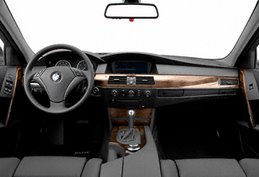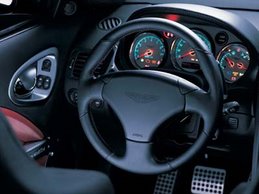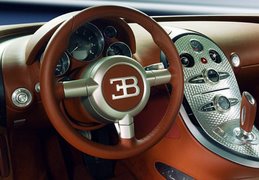 2008 Audi TT 3.2 Quattro Roadster - For 2008, the TT—still largely based on the latest Golf platform, but with extensive use of aluminum throughout—has gotten an overtly sporty makeover, starting with a crisper, chiseled evolution away from its rounded-sheetmetal roots. That philosophy also carries over into steering that’s quicker to react (although it doesn’t offer much feedback), deeply sculpted seats, and a far stiffer structure. Audi isn’t shy about this, having tuned the TT’s suspension in a way that introduces you to each and every pothole.
2008 Audi TT 3.2 Quattro Roadster - For 2008, the TT—still largely based on the latest Golf platform, but with extensive use of aluminum throughout—has gotten an overtly sporty makeover, starting with a crisper, chiseled evolution away from its rounded-sheetmetal roots. That philosophy also carries over into steering that’s quicker to react (although it doesn’t offer much feedback), deeply sculpted seats, and a far stiffer structure. Audi isn’t shy about this, having tuned the TT’s suspension in a way that introduces you to each and every pothole.The makeover worked: In our June $35,000 coupe comparo [“Four of a Kind”], a TT 2.0T finished second to a Mazda RX-8, and we said the Audi “performs like a proper sports car.”
The fully automated
 clothtop is a model of simplicity, as it folds neatly behind the seats in just 12 seconds. Even better is a power-operated wind blocker that noticeably reduces top-down turbulence in the cabin. That cabin, by the way, is extremely well finished—with beautiful gauges, top-notch brushed-aluminum trim, and an R8-like flat-bottomed steering wheel—but lacks the thoughtful design of the original.
clothtop is a model of simplicity, as it folds neatly behind the seats in just 12 seconds. Even better is a power-operated wind blocker that noticeably reduces top-down turbulence in the cabin. That cabin, by the way, is extremely well finished—with beautiful gauges, top-notch brushed-aluminum trim, and an R8-like flat-bottomed steering wheel—but lacks the thoughtful design of the original.The new demeanor is backed by a credible 0.91-g skidpad run. Although some lift-throttle oversteer can be induced, the TT is still fighting a front-drive layout with front-heavy weight distribution. Combine bumps with turns, and the TT gets flustered.
All S tronic–equipped TTs now come with launch control, which, in this case, brings engine revs to 3200 rpm and then dumps the clutch with a satisfying squawk from the front tires. Above 4000 rpm, the iron-block V-6 snarls with an athletic rasp absent in other cars with this engine. However, getting to 60 mph in 5.8 seconds and through the quarter-mile in 14.5 at 95 mph is nothing to get excited about in this class, and it’s just 0.1 second quicker in the quarter than the 2.0T coupe from the comparo.

Which brings us to the problem that inevitably emerges when scrutinizing VW/Audi products with these two engine choices: We can’t justify stepping up to the 3.2, no matter how much more standard equipment it includes. The 3.2 roadster (with S tronic) starts at $46,675, which is more than the better-in-every-way (except looks, perhaps) Porsche Boxster. Meanwhile, the 3.2’s performance isn’t hugely better than a 2.0T roadster’s, and the extra 300 or so pounds make the 3.2 feel much heavier and less willing.













No comments:
Post a Comment